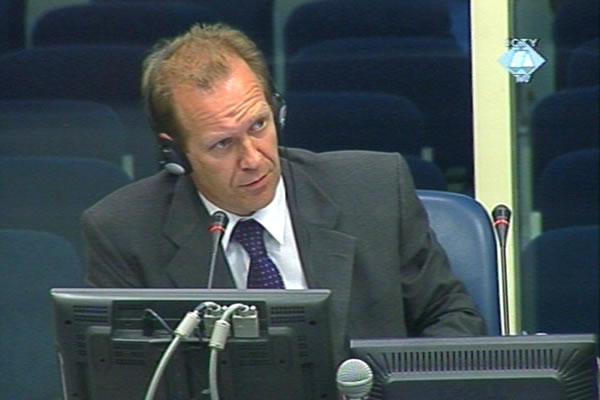Home
SPEECHLESS TALKS WITH GENERAL GOTOVINA
Soren Liborius, Danish member of the EC monitoring mission in Krajina described how at a meeting in late October 1999 General Gotovina 'tacitly agreed' with the conclusion that Croatian soldiers had perpetrated crimes. However, in his cross-examination he admitted that this allegation was 'not completely true'; it was only partially correct
 Soren Liborius, witness in the Gotovina case
Soren Liborius, witness in the Gotovina case As his examination-in chief at the trial of generals Ante Gotovina, Ivan Cermak and Mladen Markac drew to a close, former member of the EC monitoring mission in Krajina, Soren Liborius described several meetings with General Gotovina and his subordinates in the autumn of 1995.
His first meeting with Gotovina, Liborius recounted, was a private one in August 1995. In a heated debate, Liborius complained about the decision to move the ECMM regional center from a building in Knin. When Gotovina angrily left the meeting, the witness claims, one of the Croatian Army officers told Liborius that he was 'crazy' to talk like that to the 'man who had the power to decide about life and death'. Defense counsel Luka Misetic put it to the witness that this meeting actually never took place. Liborius disagreed, although he admitted that he never wrote down any notes about 'the man who had the power to decide about life and death' in his diary or contemporaneous reports.
Liborius met Gotovina the second time on 27 October 1995; this time he was with the head of the EC Monitoring Mission regional center in Knin, Gambotti. According to the witness, Gambotti then brought up the involvement of Croatian soldiers in 'incidents' – the killings of civilians, and looting and burning of abandoned Serb houses. In his examination-in chief Liborius said that Gotovina didn't make any comments; the European monitors interpreted his silence as his agreement with what they had said, as an ‘admission that soldiers were committing crimes'.
To challenge this claim, defense counsel Misetic showed him a daily report drafted by the ECMM that day, signed by the witness. The report says that Gotovina denied any claims that the crimes were committed by Croatian Army professional personnel. He laid the blame for the crimes on 'soldiers from conscript units lacking discipline' adding that the Croatian Army did not have enough qualified officers to control the troops. The witness then admitted that he did not 'tell the whole truth' when he claimed that there had been a ‘wordless conversation’ with Gotovina and that Gotovina ‘tacitly admitted' that Croatian soldiers were committing crimes. As for the claim made by the accused general that there weren’t enough trained officers, Liborius saw it as 'an ironical explanation'; Gotovina saw crimes as a natural disaster, something that could not be prevented.
Finally, in the statements he gave to the OTP investigators, the Danish monitor said that Croatian soldiers whom he saw looting abandoned Serb houses after Operation Storm told him that their superiors had granted them permission to do that. One of them explained to Liborius that the looting was their 'fee for fighting' since their salary was insufficient. Gotovina's defense counsel noted that this was not in witness's daily reports from the field he filed at that time. On the contrary, some of the reports state that the looting in Krajina was becoming widespread, adding that the monitors still 'have no impression that it is organized and planned by the higher authorities'. Liborius said he didn't write the reports in question. Had he been the author, they would not have contained those claims.
Linked Reports
- Case : Gotovina et al. - "Operation Storm"
- 2008-09-09 WHO BURNED HOUSES ‘MORE PROFESSIONALLY’?
- 2008-09-08 DEAD UNDER POLICE PROTECTION
- 2008-09-05 DAY OR NIGHT, ON SUPERIOR’S ORDERS
- 2008-09-12 WHY REPORT CRIMES TO THOSE WHO COMMITTED THEM?
- 2008-09-15 CRIME IN GRUBORI THROUGH EYE OF UN CAMERA
- 2008-09-16 CERMAK’S BUSINESS PEDIGREE
